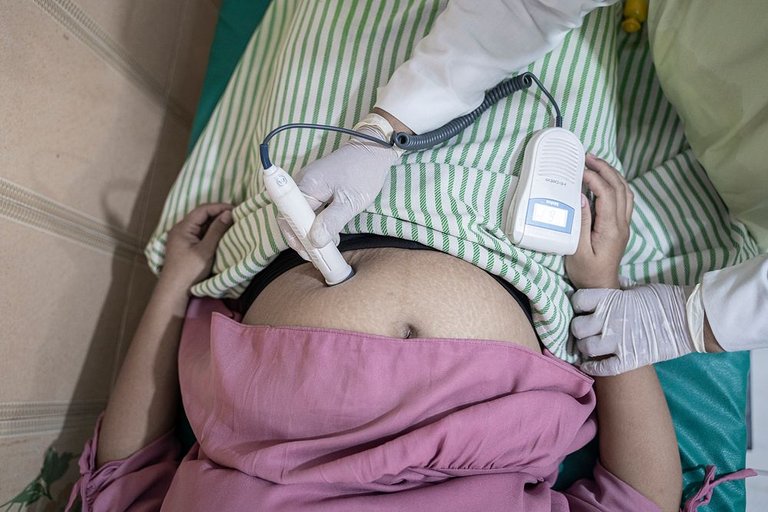My friend suggested a prenatal genetic test whilst I was pregnant, but apart from the fact that the test option is not available in the state I stay, I wasn't just interested in getting myself worked up with any type of heartbreaking information. But, come to think of it, it isn't a bad idea after all.
The prenatal genetic test provides parents with information about the presence of genetic disorders or birth abnormalities that a fetus may have. Some routine prenatal tests are completely normal, like blood count, blood type, and glucose screening that every pregnant woman is supposed to go through.
Image credit
In addition to all these basic routine tests, some people will still desire to go for an additional routine pregnancy test, which of course, is highly optional. Gene could cause genetic disorders, congenital disorders are usually present at birth, and healthcare providers can diagnose these conditions before a baby is born.
Tets are of two different types, we have diagnostic tests as well as screening tests. Screening tests cannot diagnose genetic conditions, and the presence of an abnormal result does not mean the fetus would have an abnormal genetic condition, it only means there is a higher possibility of a genetic disorder.
Carrier screening is a type of blood test that is carried out on a pregnant woman and her partner, to test for small changes in genes that could increase the risk of a fetus inheriting medical conditions, this is medically called a single-gene condition. This test shows the presence of; sickle cell disease, cystic fibrosis, and spinal muscular atrophy.
Usually, chromosomes should be inherited in pairs, each half taken from each of the parents, but sometimes, during fertilization, there comes a missing, or extra part of chromosome pair. It is in cases like this that we have; Down syndrome, and Turner's syndrome.

Image credit
A case of missed or extra chromosome may cause changes in the physical structure of a child. During pregnancy, a prenatal genetic test can help predict physical abnormalities.
Quad screen: This test measures four substances in your blood and determine the risk of the fetus having chromosomal abnormalities and neural tube defects.
AFP Screening: A doctor takes a blood sample to measure the level of AFP in your blood. High levels of AFP may be an indication of physical problems with the fetus's abdomen, spine, or face.
Nuchal translucency: This test measures the thickness of the back of a fetus's neck with the help of an ultrasound. The presence of a thick nuchal translucency provides clues about the risk for an abnormal number of chromosomes and physical abnormalities too.
Fetal anatomy scan: Makes use of an ultrasound to evaluate the physical structures of the fetus. The skeleton, heart, brain, face, arms, legs, abdomen, and kidneys that are still developing can be evaluated.
The thing about prenatal screenings is that they tell you about the possibility of a condition being present but doesn't diagnose it for sure. Remember I mentioned earlier that these tests are in two faces, and everything you have been reading before now are types of prenatal screening.
Diagnostic prenatal tests, on the other hand, can confirm if the fetus has a genetic condition. Through this test, cells are taken from the placenta or amniotic fluid and they are specifically tested for a specific disorder. Diagnostic testing is only carried out when a screening test is abnormal or if there is a risk of having a baby with a genetic condition.
The common diagnostic tests are; chronic villus sampling (CVS), and amniocentesis.
The procedure for amniocentesis involves a needle insertion through the skin into the uterus to take out a sample of amniotic fluid from the amniotic sac.
In the case of CVS, a needle is inserted into the uterus to take out small cell samples from the placenta, with a medical expert determining if it is safe to place the needle through the abdomen or the vagina.
The extracted sample will be taken to the laboratory for analysis, and the lab will perform several types of diagnostic tests. Some of the test results could be ready within the space of 72 hours while others could take more than two weeks before a result is gotten.
Getting a genetic test during pregnancy is completely a personal choice depending on what your beliefs and medical history are. Some parents go through the procedure to know if their baby will be born with a condition and how they can appropriately prepare for it.
Some families after getting devastating news may just decide not to proceed with the pregnancy, so which category would you rather fall under, one who would like to go for a genetic test or you will just wait until you get to see your baby in person?
For Further Studies.
https://my.clevelandclinic.org/health/diagnostics/24136-pregnancy-genetic-testing
https://www.ncbi.nlm.nih.gov/books/NBK557702/
https://www.cedars-sinai.org/blog/understanding-prenatal-genetic-testing.html
https://www.marchofdimes.org/find-support/topics/planning-baby/prenatal-tests
https://www.ncbi.nlm.nih.gov/books/NBK115544/

Hi, I am Tobi, a writer, speaker, relationship blogger, and lover of good music. I love making friends and learning from people. If you want to hear me speak on relationships and general life issues, you can find my YouTube channel where you can watch any episode for free, please do not forget to subscribe, friends. I sincerely appreciate every love I get from here, Kindly do well to keep them coming.
